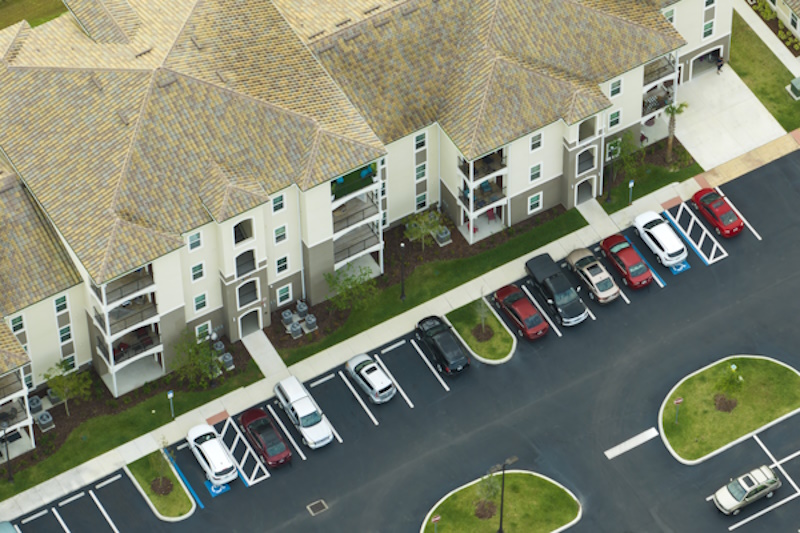Affordable housing is a critical component of a thriving community, providing much-needed shelter for individuals and families facing financial constraints. However, managing affordable housing complexes comes with its own set of challenges, one of the most prominent being parking limitations. As populations grow and urban areas become more congested, affordable housing managers must devise innovative solutions to address parking challenges effectively.
In this article, we’ll explore various strategies that affordable housing managers can employ to alleviate parking woes and enhance the living experience for residents.



Understanding Parking Challenges:
Parking shortages in affordable housing developments stem from various factors, including limited space, increased vehicle ownership, and insufficient planning. As a result, residents often struggle to find parking spots near their homes, leading to frustration and inconvenience. Moreover, inadequate parking infrastructure can impact the overall livability and attractiveness of affordable housing communities, affecting resident satisfaction and retention rates.
Solutions for Affordable Housing Managers:
1. Implement Parking Management Policies:
Effective parking management begins with the implementation of clear and enforceable policies tailored to the needs of the community. Affordable housing managers can establish guidelines regarding parking permits, guest parking, and vehicle registration to ensure fair and orderly parking allocation. Additionally, implementing parking enforcement measures, such as issuing warnings or fines for violations, can help deter unauthorized parking and ensure compliance with the established rules.
2. Optimize Existing Parking Spaces:
Maximizing the utilization of existing parking spaces is essential for alleviating parking shortages in affordable housing complexes. Managers can explore creative solutions such as restriping parking lots, reconfiguring parking layouts, and implementing compact parking spaces to accommodate more vehicles within the available space. Additionally, designating specific areas for carpooling, electric vehicle charging stations, and bicycle racks can encourage alternative modes of transportation and reduce the demand for parking.
3. Explore Off-Site Parking Solutions:
In cases where on-site parking is limited, affordable housing managers can consider partnering with nearby businesses, churches, or municipal parking facilities to secure off-site parking options for residents. Negotiating agreements for reserved parking spaces or shuttle services can provide residents with convenient access to additional parking while minimizing the strain on on-site parking resources. Moreover, promoting public transportation options and providing incentives for residents to use alternative modes of transportation can further alleviate parking demand.
4. Invest in Technology Solutions:
Technology can play a pivotal role in addressing parking challenges and improving the overall parking experience for residents. Affordable housing managers can leverage parking management software and mobile applications to streamline parking permit registration, payment processing, and enforcement activities. Additionally, deploying smart parking solutions, such as sensor-based parking systems and real-time occupancy monitoring, can provide valuable insights into parking usage patterns and help optimize parking allocation strategies.
5. Prioritize Pedestrian and Bicycle Infrastructure:
Encouraging walking and cycling as viable transportation alternatives can reduce the reliance on automobiles and alleviate parking demand in affordable housing communities. Affordable housing managers can invest in pedestrian-friendly infrastructure, such as well-lit walkways, sidewalks, and crosswalks, to enhance safety and accessibility for residents. Furthermore, providing secure bicycle storage facilities and amenities, such as bike racks and repair stations, can promote cycling as a convenient and sustainable mode of transportation.
6. Foster Community Engagement and Education:
Effective parking management requires the active participation and cooperation of residents. Affordable housing managers can engage residents through community meetings, surveys, and outreach campaigns to solicit feedback, address concerns, and raise awareness about parking policies and initiatives. By fostering a sense of shared responsibility and encouraging dialogue, managers can cultivate a supportive community environment conducive to resolving parking challenges collaboratively.
Conclusion:
Affordable housing complexes must implement a multifaceted approach to parking challenges that incorporates strategic planning, innovative solutions, and community engagement. The management of affordable housing can reduce parking shortages and improve residents’ quality of life by implementing parking management policies, optimizing existing spaces, exploring off-site parking solutions, investing in technology, prioritizing pedestrian and bicycle infrastructure, and fostering community engagement and education.
In order to ensure equitable access to parking resources and foster vibrant, inclusive communities, proactive and sustainable parking management strategies are essential.




